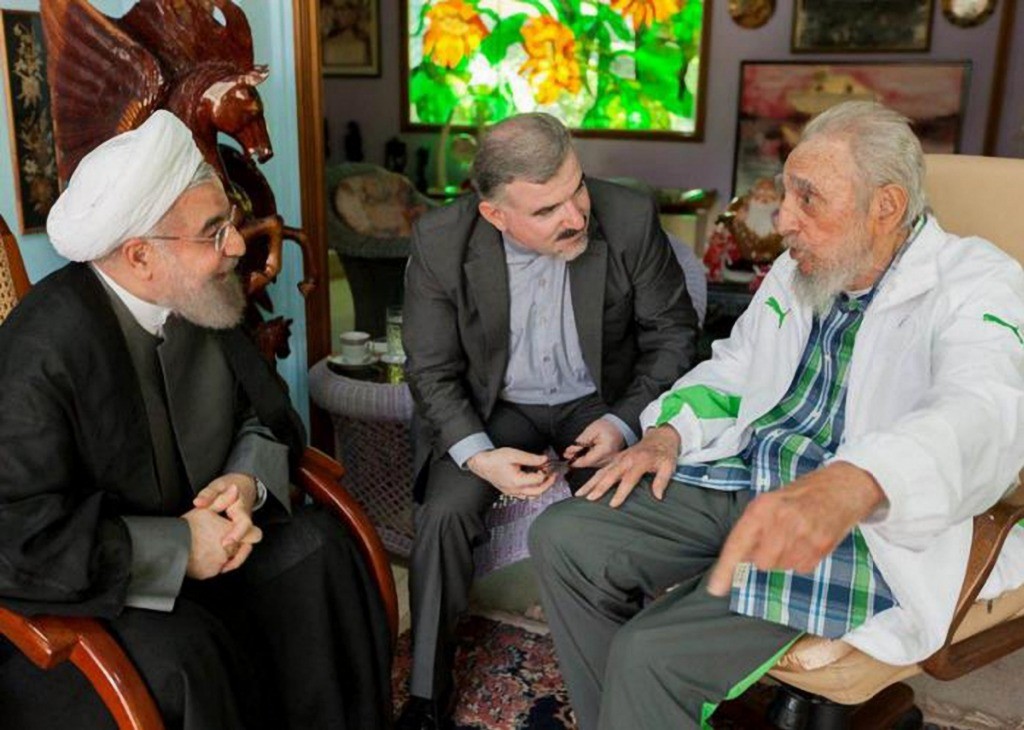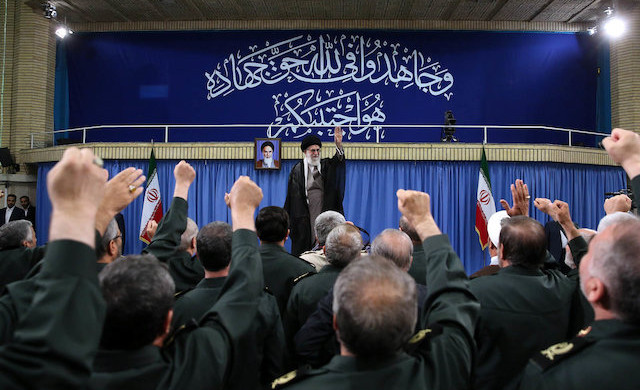LATEST
- Lebanese-Iranian Internet Activist Zaka Gets 10-Year Sentence
- Rouhani Proclaims Resistance and Cooperation in Cuba
Iran’s Supreme Leader has maintained his hostile rhetoric towards the US and pressure on the Rouhani Government, telling Revolutionary Guards commanders that “distrust” of America must be escalated.
Ayatollah Khamenei told the commanders on Sunday:
We observed America’s hostility during the long years after the Islamic Revolution, during the recent nuclear negotiations, and in other issues.
One of the most important elements of the Islamic Republic’s soft power is complete distrust of imperialist powers – headed by America – and this distrust should increase on a daily basis.
Even more significant were Khamenei’s swipes at President Rouhani and his foreign policy of “engagement”, including the July 2015 nuclear deal with the US and other powers.
The Supreme Leader belittled the historic agreement and its prospects for security and a recovering Iranian economy:
Throughout the past several years, some officials have credited the removal of the military threat and war to certain [political] measures. That is not true. The only factor in removing the military threat has been and will continue to be military and defensive power and the creation of fear in the enemy.
He then appeared to criticize Rouhani’s officials: “Some individuals say that America is an enemy, but there are no feelings of mistrust in them.”
Khamenei again banned any discussions with the US apart from implementation of the nuclear agreement: “[It] has no aim except preventing the regional presence of Iran, the primary factor behind America’s failures….Negotiations with the U.S. are not only useless but also harmful.”
The Supreme Leader was supported by the head of the Revolutionary Guards, General Mohammad Ali Jafari: “We will not allow America’s evil plan to influence and transform [Iran’s] political system to be realized.”
President Rouhani will be in New York this week for the UN General Assembly. The regime has made clear that he will not meet Barack Obama.
Lebanese-Iranian Internet Activist Zaka Gets 10-Year Sentence
Lebanese-American activist Nizar Zaka has been given a 10-year sentence and fined $4.2 million on charges of espionage.
Zaka, an advocate for Internet freedom whose nonprofit group did work for the US Government, disappeared in September 2015 after he came to Iran to attend a conference at which President Hassan Rouhani spoke of sustainable development and more economic opportunities for women. Iranian authorities announced his detention in early November.
Iranian authorities, notably the Revolutionary Guards, have detained a series of dual nationals since last autumn. Among them are Iranian-American businessman Siamak Namazi and his 80-year-old father Baqer, the Anglo-Iranian charity worker Nazanin Zaghari-Ratcliffe, and Canadian-Iranian academic Homa Hoodfar.
Jason Poblete, a US lawyer representing Zaka, said a Revolutionary Court in Tehran handed down the sentence in a 60-page verdict. Amnesty International said Zakka had only two court hearings before the ruling and received only limited legal assistance before the closed-door court.
The prison term was handed down by the hardline Judge Abolghassem Salavati, who has sentenced other dual nationals such as Iranian-American journalist Jason Rezaian.
Rouhani Proclaims Resistance and Cooperation in Cuba
Continuing Iran’s diplomatic offensive in Latin America, President Rouhani has proclaimed resistance and cooperation during a visit to Cuba.
Rouhani said at a Monday meeting:
We should take the post-JCPOA [nuclear opportunity and potentials of the two countries to promote cooperation between Iran and Cuba in all fields, especially economy….
Some major powers are trying to pressurize and impose sanctions on independent countries to maintain their monopoly in modern and key technology.
He said Tehran and Havana could work together on in areas such as nano- and bio-technology.
Continuing the implied theme of a strong stand against the US, Rouhani invoked “Cuban people’s spirit of resistance against colonizers and domination-seekers”: “The Iranian nation, as well, resisted during the eight-year imposed war [with Iraq in the 1980s], when the East and the west were helping the aggressor. the same powers continued their pressures and sanctions later after the war under different pretexts.”
Last month, Iranian Foreign Minister Mohammad Javad Zarif visited six Latin American countries, including Cuba and Venezuela, in seven days. Last week, Rouhani saw the Venezuelan, Bolivian, and Ecuadorean leaders at the Non-Aligned Summit in Venezuela.
Rouhani with former Cuban President Fidel Castro:

Photo: Alex Castro/AP

